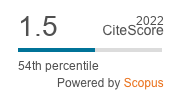Management Accountant’s Role and Functions in the Enterprise Resource Planning Environment – Author’s Own Research into Enterprises in Poland
DOI:
https://doi.org/10.2478/v10103-012-0009-7Abstract
ERP systems have revolutionized practically all aspects of business processes in enterprises. They help improve the processes by ensuring their integration. Ensuring integration between financial and non-financial data, an ERP package gives new quality to the management of enterprise value. All these features make ERPs particularly important for specialists responsible for providing management information and measuring performance of the company. This article seeks to answer whether the implementation of an ERP system has an effect on the management accountant’s tasks and functions, especially in the field of performance measurement and internal reporting. The ERP impacts on the controller’s role in the organization will be evaluated using field studies on six enterprises owned by multinational corporations. The question that should be asked here is whether controller’s functions and tasks will also be unaffected.
Downloads
References
Balvinsdottir G., Burns J., Norreklit H., Scapens R.W. (2009), The management accountant`s role, ‘Financial Management’, September, pp.33-34
Google Scholar
Balvinsdottir G., Burns J., Norreklit H., Scapens R.W. (2009), The image of accountants: from bean counters to extreme accountants, ‘Accounting, Auditing & Accountability Journal’, Vol. 22, Issue 6, pp.858-882
Google Scholar
Booth P., Matolcsy Z., Wieder B. (2000), The impact of enterprise resources planning on accounting practice – Australian experience, ‘Australian Accounting Review’, Vol. 10, No. 3, pp.4-18
Google Scholar
Burns J., Scapens R.W. (2000), The changing nature of management accountants and the emergence of ,,Hybrid” accountants, IFAC in the News & Video Library, www.ifac.org/Library/Novemebr., status as on 15 Sept. 2011
Google Scholar
Caglio A (2003), Enterprise Resource Planning systems and accountants: towards hybridization?, ‘European Accounting Review’, Vol. 12(1), pp.123-153
Google Scholar
Cooper R. (1996), Look out, management accountants, ‘Management Accounting’, June, pp.35-41
Google Scholar
Ernst & Young, The changing role of the financial comptroller, Research report, www.ey.com, 2008, status as on 15 Sept. 2011
Google Scholar
Granlund M, Malmi T. (2002), Moderate impact of ERPS on management accounting: a lag or permanent outcome?, ‘Management Accounting Research’, Vol. 13, pp. 299-321
Google Scholar
Griffin J., Dempsey S. (2010), How influential are accountants in the implementation of an integrated systems? A case study in an Irish public sector organisation, ‘Irish Accounting Review’, Vol. 16, No. 2, 31-49
Google Scholar
Kaplan R.S. (1995), New roles for management accountants, ,,Journal of Cost Management”, Vol. 9, No. 3, pp.6-13
Google Scholar
Kavanagh S. (2001), Application service providers (ASPs): can ASPs bring ERP to the masses?, ‘Government Finance Review’, Vol. 17, No. 4, pp.10-14
Google Scholar
O`Mahony A., Doran J. (2008), The changing role of management accountants, evidence from the implementation of ERP systems in large organisations, ‘International Journal of Business and Management’, August, pp. 109-115
Google Scholar
Quattrone P., Hopper T. (2001), If I don`t see it I cannot manage it: The Quasi-ontology of SAP. Accounting, Translations, and Visibility in Multinational Organisations, Paper presented at the 24th Annual Congress of the European Accounting Association, Athens
Google Scholar
Quattrone P., Hopper T. (2005), A ’time-space odyssey’: management control systems in two multinational organisations, ‘Accounting, Organization and Society’, Vol. 30, pp.735-764
Google Scholar
Scapens R.W., Ezzamel M., Burns J., Baldvinsdottir G. (2003), The future direction of UK management accounting practice, CIMA Publishing, Elsevier, Amsterdam, Boston, London
Google Scholar
Scapens R.W., Jazayeri M. (2003), ERP systems and management accounting change: opportunities or impacts? , ‘European Accounting Review’, Vol. 12, No. 1, pp. 201-233
Google Scholar
Shang S., Seddon P. (2002), Assessing ad managing the benefits of enterprise systems: the business manager`s perspective, ‘Information Systems Journal’, Vol. 12, No. 2, pp. 271-299
Google Scholar
Sobańska I. (2003), Rachunkowość zarządcza, [in:] Irena Sobańska (ed.), Rachunek kosztów i rachunkowość zarządcza, Wydawnictwo C.H. Beck, Warszawa, pp.32-57
Google Scholar
Sobańska I., Wnuk T. (2003), Zmiany w praktyce rachunkowości na przełomie XX i XXI wieku, ‘Zeszyty Teoretyczne Rady Naukowej’, SKwP, 56, Warszawa, pp.215-221
Google Scholar
Spathis C., Constantinides S. (2004), Enterprise resource planning systems` impact on accounting processes, ‘Business Process Management Journal’, Vol. 10, No. 2, pp.234-247
Google Scholar
Szychta A. (2002), The scope of application of management accounting methods in Polish enterprises, ‘Management Accounting Research’, Vol. 13, No. 4, pp.401-418
Google Scholar
Szychta A. (2005), Rola współczesnych specjalistów do spraw rachunkowości zarządczej w świetle ewolucji jej zakresu i metod, ‘Zeszyty Teoretyczne Rachunkowości’, 25(81), pp.80-107
Google Scholar
Downloads
Published
How to Cite
Issue
Section
License

This work is licensed under a Creative Commons Attribution-NonCommercial-NoDerivatives 4.0 International License.











